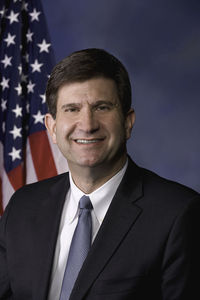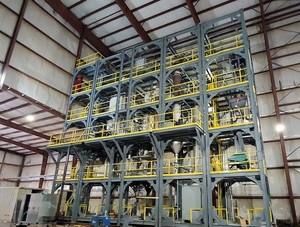Sustainable Skies Act aims to enact blenders credit for SAF
Energy Disrupter
ADVERTISEMENT
Rep. Brad Schneider, D-Ill., on May 20 introduced the Sustainable Skies Act, which aims to create a tax credit to encourage blending of sustainable aviation fuel (SAF). The credit’s value would be based on greenhouse gas (GHG) emissions reductions and would be in place through the end of 2031.
The credit, starting at $1.50 per gallon, would be available to blenders of SAF that can demonstrate 50 percent or greater lifecycle GHG emissions reductions when compared to standard jet fuel. An additional 1 cent per gallon could be claimed for each percentage the fuel reduces emissions over 50 percent. That means that SAF that reduces emissions by 70 percent would be eligible for a $1.70 per gallon credit, and that SAF that achieves a 99 percent reduction could claim a $1.99 per gallon credit. The maximum credit would be set at $2.00 per gallon.
Eligible fuels would be required to follow the sustainability criteria established by the International Civil Aviation Organization, or a methodology determined by the U.S. EPA to be at least as stringent as ICAO’s. Eligible SAFs would be required to utilize the full suite of ICAO sustainability criteria, including accounting for both aggregate attributional core lifecycle emissions and induced land change. The credit would not be available for fuel made from palm fatty acid distillates (PFAD) feedstock.
Reps. Dan Kildee, D-Mich., and Julia Brownley, D-Calif., are cosponsoring the bill. Sen. Sherrod Brown, D-Ohio, is expected to introduce companion legislation in the U.S. Senate soon.
The Sustainable Skies Act is not the only bill introduced this year that aims to incentivize the use of SAF. Brownly in February introduced the Sustainable Aviation Fuel Act, which aims to create a slightly different blenders tax credit. Companion legislation for that bill was introduced in the U.S. Senate by Sen. Sheldon Whitehouse, D-R.I., earlier this month. Brownley’s bill would also establish a Low Carbon Fuel Standard for aviation fuels and includes several additional provisions, including those to support infrastructure and feedstock development.
LanzaJet, Neste and the Biotechnology Innovation Organization on May 20 spoke out in support of Schneider’s bill. The SAF Coalition also sent a letter expressing support for the legislation to Schneider, Brownley and Kildee. The coalition includes a wide variety of members, including BIO, AvFuel, Fulcrum Bioenergy, Gevo, LanzaTech, LanzaJet, Neste, Red Rock Biofuels, Velocys and World Energy.
“We’re on the precipice of catalyzing the development of a robust domestic sustainable aviation fuels (SAF) industry that will position the U.S. as a leader in renewables and allow our global society to make significant progress towards decarbonization. With a long-term, performance-based blender’s tax credit for SAF, we will be able to invest in and produce SAF at scale across the U.S.,” said Jimmy Samartzis, CEO of LanzaJet. “The tax credit will significantly reduce greenhouse gas emissions from aviation, improve local air quality and enable a path to net-zero emissions for the aviation industry. We applaud Rep. Schneider, Rep. Kildee, and Rep. Brownley for their leadership in enabling a cleaner and more sustainable future for our country and for aviation.”
“Reducing greenhouse gas emissions and pollution from aircraft is one of the biggest challenges facing the aviation industry and is a priority for Neste, one of the world’s most sustainable companies,” said Jeremy Baines, president of Neste US. “Neste commends Reps. Schneider, D-Ill.; Kildee, D-Mich.; and Brownley, D-Calif., for showing leadership through the introduction of their sustainable aviation fuel (SAF) blenders tax credit legislation, a practical solution that can be immediately deployed, accelerate the production and use of SAF, and help ensure that Americans can keep flying both affordably and with a much smaller carbon footprint.”
“Decarbonizing aviation is one of the most pressing challenges to solving the climate crisis. However, thanks to innovative biotechnology and biofuel producers, realizing green aviation is possible. This bill to incentivize the production and use of sustainable aviation fuels is critical if we are to reduce greenhouse gas emissions in the U.S. transportation sector and truly address climate change. It will bolster rural economies across the country by creating new revenue streams for agricultural producers and value-added markets for waste products. BIO thanks U.S. Representatives Schneider, Kildee, and Brownley for the introduction of the Sustainable Skies Act and we look forward to working with lawmakers as it moves through Congress,” said Michelle McMurry-Heath, president and CEO of BIO.
“Despite the aviation industry’s concerted efforts, there is very limited availability of SAF today, and the SAF that is available is significantly more expensive than conventional jet fuel,” said the SAF Coalition in its letter. “Moreover, SAF is not currently competitive with similar low-carbon transportation fuels for the ground sector in part due to the incumbent status of those fuels and a policy environment that favors them at the federal and state level. The Sustainable Skies Act would help immensely in the effort to scale up the supply of SAF, enhance its cost-competitiveness with conventional jet fuel, provide needed policy parity, and transition the SAF industry from its current nascent stage to a mature industry capable of providing airlines, general and business aviation, and other users with sizable quantities of the low-carbon fuel at commercially reasonable prices.”
A full copy of the bill can be downloaded from Schneider’s website.
















